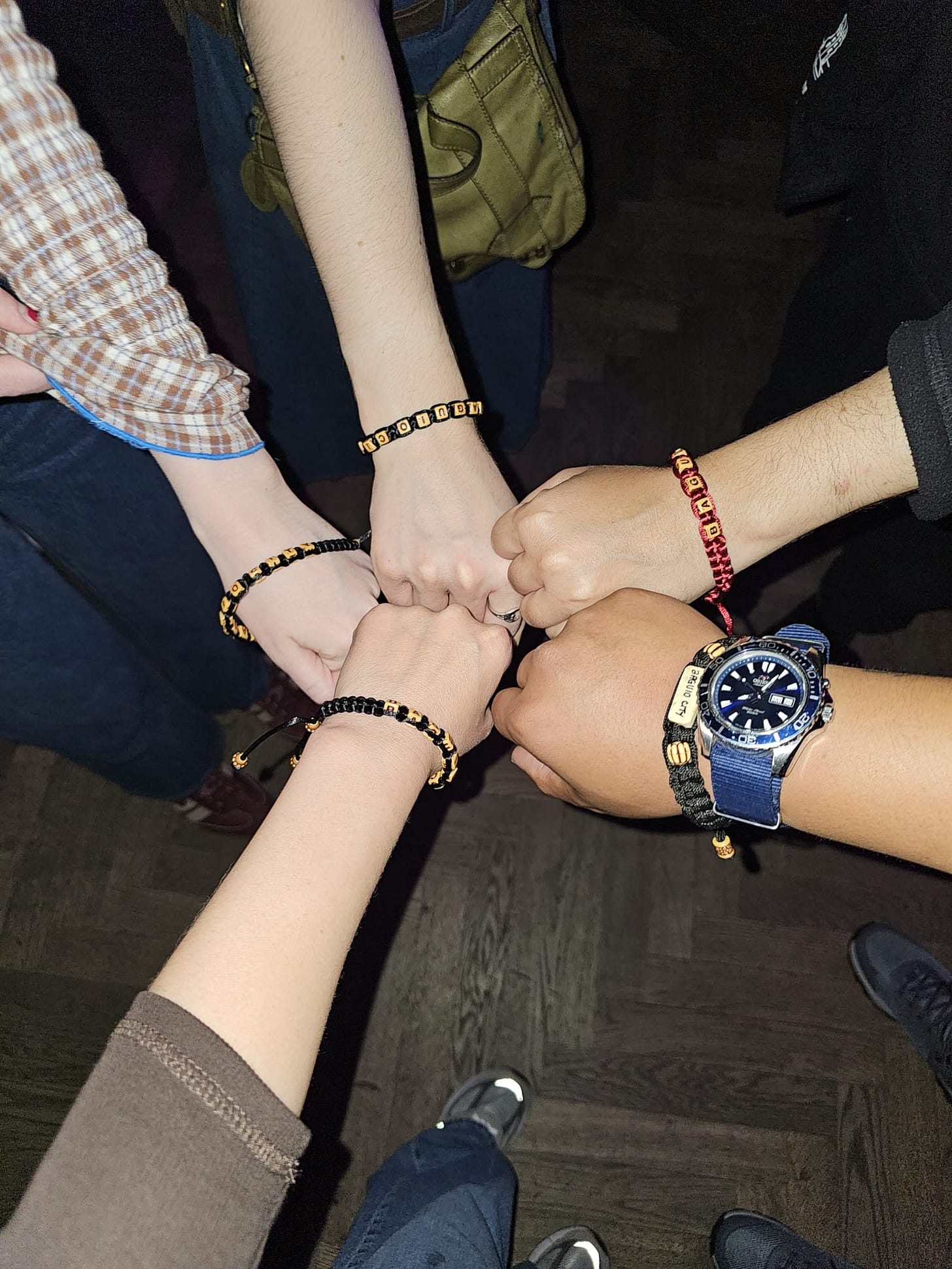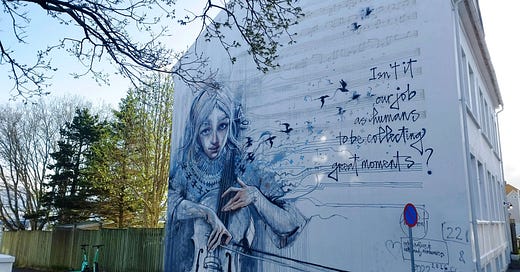"You told me I looked ugly.”
We met by chance. I was attending a writing retreat; she was on vacation with her husband, who’d fallen slightly ill and decided to hole up in their hotel room. We were nibbling on a relatively less expensive brunch at Sandholt, in downtown Reykjavík. This was our first time speaking, three years after our relationship ended.
"I never said that," I was confused. "I would never use that word to describe you."
"It was the night of your best friend’s gallery opening," she insisted. “I wore that green dress I'd been working on. You looked at me and said I looked ugly."
I remembered that night. Her excitement about the dress, my impatience as we were running late, the tension between us in our apartment.
"I remember saying something about the dress not making you look confident,” I said.
"That's not how I remember it."
I was sure I never used the word “ugly” on her. First, I wouldn’t date someone I’d call ugly. But more importantly, I would never use a word like that on someone with appearance anxiety, as she had. I explained all of this to her.
"What I said was insensitive,” I concluded, “especially because I didn't realize you'd designed part of the dress yourself. But the exact wording matters too."
Her expression changed. "You knew I designed part of it?"
"Not at the time. You told me later, during our argument.” That's when I understood why what I said hurt more than expected.
"I attended this writing workshop," I continued. "We talked about memory and how emotions change what we remember. How feelings can transform our recollection of events."
She nodded. "Like how 'not confident' became 'ugly' in my mind."
If I had simply accepted her version of events, if I had apologized for calling her ugly without clarifying what was actually said, we both would have missed the real reason my comment hurt: I had been inattentive, even borderline dismissive, of something she had created with care.
"My therapist once asked me to try to remember exactly what was said in an important memory,” she said. “I realized I'd been remembering the feeling more than the words."
As we talked, and after I apologized for my actual mistake of being inattentive and dismissive, the conversation shifted to what I was doing at the Retreat. I mentioned one workshop panelist's concept of the "Three-Bodies Problem" in writing about your life: who you are now, who you were then, and the creative writer in you wanting to tell a good story out of your life. Each “body” has different knowledge and blind spots. She said it resonated with her own experience of therapy; this sense of looking back at her younger self with both compassion and clearer vision.
Then we talked about her life in Toronto, the mutual friends we still kept in touch with. As we prepared to leave, she said something that has stayed with me:
"If someone asked what went wrong between us, I would have said you could be cruel. But that's not really it, is it? You just sometimes didn't notice things that mattered to me, and I sometimes expected you to understand without telling you.”
As I watched her walk away, I thought about how a single misremembered conversation had colored years of her understanding of our relationship, and about how many of my own memories might have been similarly transformed by feelings.
Something about this encounter felt important. That night, I jotted down notes as the conversation poked at things I'd been thinking about throughout the Retreat: How do we balance factual truth and emotional truth when looking back at our lives? And how does establishing the former matter for truly understanding the latter?
The gift of being a writer is that you get to live three times: Once in the moment, then as it lingers in memory, and finally as you give it form on the page, hopefully into a story that can outlive you.
Afterword
None of the conversation I just described actually happened.
There was no chance meeting in Iceland, no discussion over coffee about a misremembered comment. I don’t have an ex who is married and living in Toronto.
However, I did attend the Iceland Writers Retreat recently as an Alumni Awardee. I attended several workshops related to memoir writing at this Retreat, one of them called “The Three Bodies Problem” by the Syrian-Canadian author, Danny Ramadan. I had a great (solo) brunch at Sandholt in downtown Reykjavik. And I did have a conversation with a present partner who thought I called her “ugly” when the words I actually said were something along the lines of “that outfit makes you look unconfident.”
The reason I started this piece with a factually untrue but emotionally genuine introduction is to highlight the essential role of self-awareness in creative nonfiction. Before reshaping our experiences into stories, I believe we must first honestly acknowledge what actually happened versus what didn't. This self-awareness serves two crucial purposes: for writers, it establishes a realistic understanding of our own lives, which prevents us from being misled by emotionally-distorted memories; and for readers, it builds trust that we're being honest guides through our experiences, even when we take creative liberties. Without this foundation of factual self-awareness, we risk both personal self-deception and betraying the reader's confidence in our authenticity.
Memory is fallible. When we sit down to reflect on our lives, whether it’s to write an actual memoir or simply to make better sense of our experiences, we often face the dilemma of not remembering things according to how they really happened. Human memory, in practice, feels less like a recollection and more like a reconstruction: Each time we recall something, we tend to rebuild it according to our biases and feelings.
When my partner remembered me calling her "ugly" rather than making a thoughtless comment about her outfit, it changed the entire meaning of what happened between us. This distinction matters because it changes the nature of the hurt, the appropriate response, and what we might learn from the experience. We would never have discovered this distinction if we hadn't first established what was actually said.
At the Retreat, Ramadan once recalled someone who read his memoir and, pointing to a specific section, said, “That’s not how it actually happened!” To that, Ramadan’s response was something like: It’s my book. If you want to say your own version of events, you’re welcome to write and publish your own memoir.
I love Ramadan and his workshop, but I believe it’s more valuable for writers to first do their best to recall what was actually said or what truly happened, before shaping their own “emotional truth.” Using Ramadan’s own framework, the three bodies at play can reveal a great deal about the writer’s life and choices.
Body 1: The past self didn't know how things would turn out and couldn't see the larger patterns that only become visible with time.
Body 2: The present self has the benefit of hindsight but is biased by current perspectives and emotional needs.
Body 3: The creative self wants coherence, meaning, narrative satisfaction; sometimes at the expense of messy reality.
This framework made it clearer to me why factual truth matters so much when reflecting on our lives. Factual truth is often more complex and revealing than our simplified emotional memories.
Another workshop panelist, the English author and naturalist, Helen Macdonald, emphasized the importance of grounding personal reflection in concrete, physical objects. "Add a focus on the materiality of your world," Macdonald advised. "Describe the setting, the light, the objects. These are things you actually remember… Holding, touching, feeling, seeing."
This advice connects directly to the pursuit of factual truth. When we anchor our recollections in specific details like the exact color of a wall, the texture of a tablecloth, or the weight of an object in our hands, we create reference points that help distinguish between what actually happened and what our emotions have subsequently colored or reshaped.
How does this matter beyond the practice of writing?
How we remember our lives shapes who we think we are and how we relate to others. When memories become distorted by emotion, we end up with stories about ourselves and our relationships that don't reflect reality. We might vilify people who don't deserve it, take on guilt we shouldn't carry, or miss opportunities for genuine understanding and growth.
Of course, emotional truth matters. How we felt about what happened is a crucial part of the story. But when emotional truth completely overwrites factual truth - when "that dress makes you look unconfident" becomes "you look ugly" in memory - something important is lost. I believe it is very much possible to acknowledge how something made us feel while also committing to accuracy.
Of course, perfect accuracy is impossible. But that limitation does not absolve us of the responsibility to try. The impulse to let emotional truth eclipse factual truth is powerful: Emotions insist on being heard, and they tend to shape coherent narratives from the disorder of life. But that ease comes at a cost. Being grounded in facts is harder, but it allows for a richer and more complex emotional understanding. We may come to see that what wounded us was not what we believed, and the patterns we recognize in others may, in part, begin within ourselves.
To anyone writing about their life: try to start with the facts. Begin with what actually happened. Consult your past self as clearly and honestly as you can before turning to how it made you feel. Then let your present self evaluate them with objective hindsight. Once done, you can finally let your creative writer self take control of the storytelling.







Intriguing take, especially the false narrator stuff at the beginning (ya got me..).
I play with the notion of NOM-fiction writing (nominally fictional) as a category they really should create. So much of what seems 'real' in our heads is distorted, even delusional..and the more emotional attachment there is the stranger these 'truths' become.
I write inner child healing narratives, mostly my own inner work chronicled, though others are starting to come forward as well. So now we're talking child memories, usually trauma related. 'Start with the facts' takes on a whole new meaning there. The biggest fact to contend with in the first place is usually 'trauma occured'.
Fascinating stuff. Thank you for this excellent thought-piece on writing. Loved it.